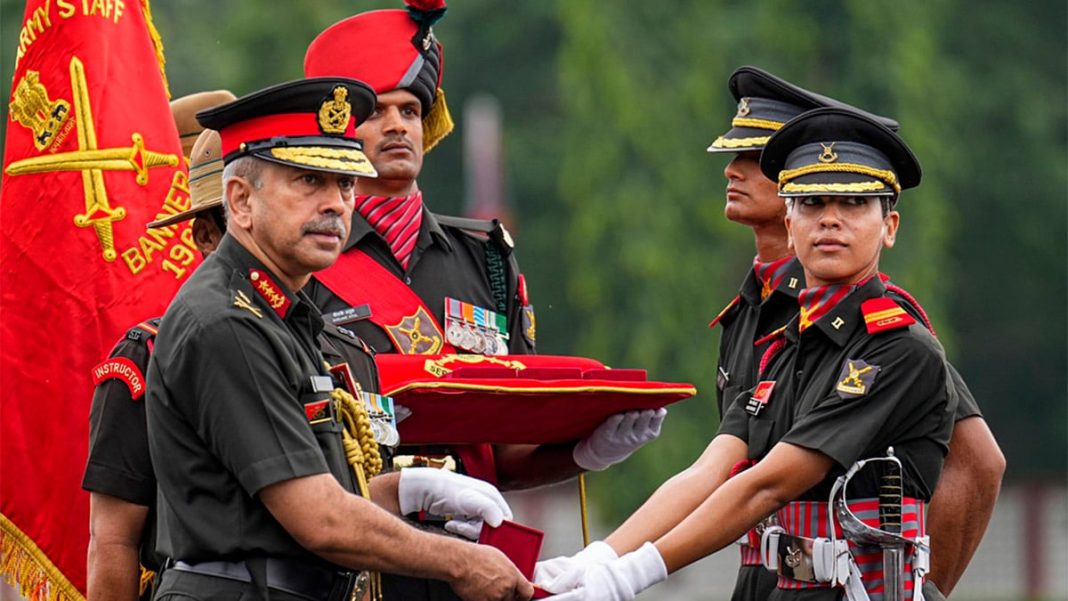As the Indian Army embraces a more inclusive framework, the involvement of women officers is becoming increasingly significant, with their roles expanding from command positions to critical strategic decision-making. Despite notable advancements, challenges persist, particularly highlighted in the recent context of the Indian Army’s 17 Corps, also known as the Brahmastra Corps, located in Panagarh, West Bengal. This vital formation is charged with the protection of the strategically crucial Siliguri Corridor and the Doklam region, a focal point during the 2017 standoff with China. These developments have stirred a deeper conversation surrounding the operational readiness and behavioral dynamics of women officers at the Colonel rank.
The discourse was initiated when a former Corps Commander of the 17 Corps raised concerns regarding the leadership preparedness of women officers in a letter to a senior Army official. This correspondence, reported by the Times of India, calls into question the effectiveness and integration of women in command roles, shedding light on gender disparities that affect operational performance.
Maj Gen VK Singh (Retd) has voiced strong support for the former Commander’s letter, underscoring the weight of the concerns expressed. He posited that the need for such communication reflects genuine observations and worries aimed not at undermining women in the military but at enhancing the Army’s overall efficacy. He emphasized that both men and women undergo the same training processes, yet acknowledged the necessity of accommodating physiological differences to ensure equal opportunities. He reiterated that while women should be granted the same chances to succeed, there are inherent risks associated with frontline assignments, which need to be taken into account.
However, the dialogue raised by former Lt Gen Puri, who commanded the 17 Corps, points to structural inequalities within the Army’s development programs. In a recent communication with Lt Gen RC Tiwari, he highlighted that women officers are often deprived of essential training opportunities, such as junior command and staff college courses, which are critical for ascension to commanding roles. His detailed observations exposed behavioral patterns among female officers, citing issues like frequent grievances against junior ranks, limited collaboration in decision-making processes, and an overt centralization of authority that may lead to undue stress across ranks.
The Indian Army has made commendable strides in integrating women across various branches. Although core combat roles in infantry and mechanized units are yet to open, women have made their mark in support arms, including signals, engineers, and intelligence. These sectors significantly impact military operations, indicating a shift towards recognizing women’s contributions in essential roles. The ongoing transition towards inclusivity, bolstered by a Supreme Court mandate for permanent commissions and leadership roles for women, poses unique challenges concerning operational readiness and gender integration.
Despite these hurdles, Maj Gen Singh emphasized the necessity for a gender-neutral approach within the forces, especially as India navigates complex security challenges from neighboring countries. He pointed out that substantial opportunities exist for women in intelligence and cyber domains, where their skills can significantly enhance operational effectiveness away from direct confrontation.
Looking to global examples, the Indian Army can learn from the United States and Israel, both of whom have successfully integrated women into military leadership positions. The US has opened all combat roles to women since 2015, adapting fitness training to gender differences while ensuring mutual respect and collaboration in mixed-gender units. Similarly, Israel’s military framework emphasizes equal foundational training for men and women, with a focus on preparing female officers for high-stress roles, further indicating the effectiveness of comprehensive training in enhancing female military participation.
As women increasingly assume pivotal roles within the Indian Army, the focus must shift towards addressing existing gaps in training and opportunities to foster an environment free from gender biases. This pursuit of a level playing field not only enhances military performance but also affirms the significance of inclusivity in shaping a resilient and effective armed force for the future.





